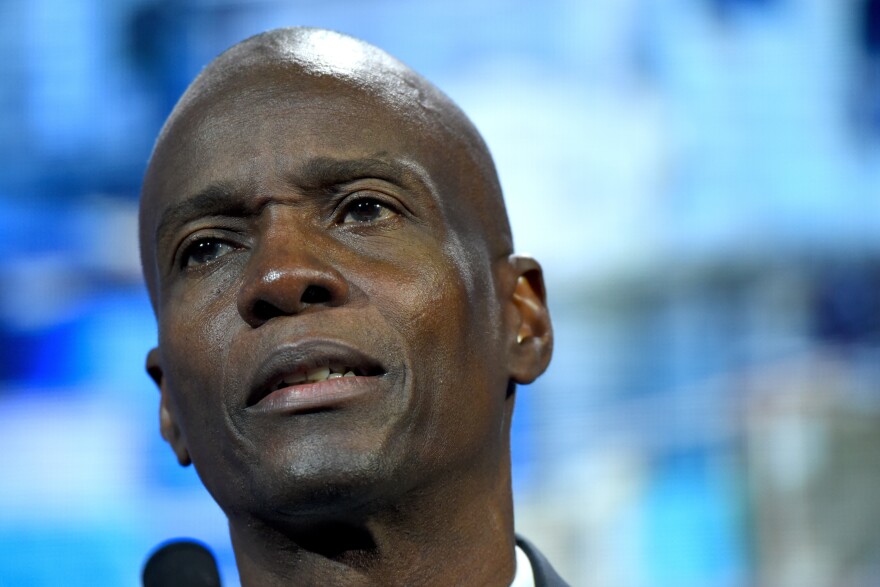Updated July 7, 2021 at 1:46 PM ET
Jovenel Moïse, Haiti's embattled president who thrust the country into deeper political turmoil during his tumultuous one term in office, was assassinated overnight at his private residence, according to the country's acting prime minister.
Prime Minister Claude Joseph said a group of people attacked the president's private residence and killed him, calling it an "odious, barbaric" act.
"Haiti has lost a true statesman who was committed to progressing our country's democratic transition and fighting corruption," Joseph said.
The first lady was wounded by a bullet and is receiving care, he added.
How the attack unfolded
Joseph said the assassination occurred at the Presidential Palace around 1 a.m. Wednesday.
"This was a highly coordinated attack by a highly trained and heavily armed group," he recounted in a statement, according to a CNN translation.
He had previously said without explanation that some of the unknown attackers were speaking Spanish. The primary languages in Haiti are French and Haitian Creole.
More details on the attack would be released, Joseph promised, as he vowed to catch the perpetrators responsible for Moïse's killing. He called for an international investigation into the assassination and urged the United Nations to hold a Security Council meeting about the situation in the Caribbean country.
In an earlier statement, Joseph said officials are taking "every measure" to ensure the continuity of government in Haiti, which has a history of leaders being overthrown and occasionally killed.
Moïse went from "Banana Man" to president
Moïse, 53, came into office in 2017 after a lengthy election process marred by delays and accusations of fraud.
Although he had never held political office before, Moïse was tapped for the post by the country's previous president, Michel Martelly, who stepped down in 2016 without a successor in place.
Moïse was a wealthy businessman who made his fortune exporting fruit, earning him the moniker of "The Banana Man."
More recently, Moïse had been under pressure to resign in February at the time his opponents considered the end of his five-year term. He insisted he still had another year as president because he took office late.
Haiti is facing ongoing political turmoil
Moïse, who had seven prime ministers during his brief stint in office, had been ruling by decree for more than a year since the Parliament was disbanded.
The political upheaval in the poorest country in the Western Hemisphere has sparked ongoing political protests and an uncontrolled crime wave fueled by gangs. Rival gangs control some important areas of the country, and kidnappings are on the rise as well as food and fuel shortages.
Haiti has also struggled to control its COVID-19 outbreak, which has flooded hospitals with patients and led to an oxygen shortage. The first vaccines arrived in Haiti in mid-June.
On Monday, Moïse announced he was appointing a new prime minister, Dr. Ariel Henry, who was tasked with unifying the government and preparing for elections scheduled for later this year.
Loading...
What comes next?
The streets of the capital, Port-au-Prince, were largely empty early Wednesday morning, though some people ransacked businesses in one area, The Associated Press reported.
The U.S. closed its embassy in Tabarre and urged people to avoid unnecessary travel "due to an ongoing security situation."
The international airport was also shut down, according to the AP. Haiti-based Sunrise Airways says "all flights are cancelled and/or delayed" due to the current situation.
The Dominican Republic said it was closing its border with Haiti on the island of Hispaniola, Reuters reported.
President Biden denounced what he called the "horrific assassination" of Moïse. "We condemn this heinous act," he said in a statement. "We stand ready to assist as we continue to work for a safe and secure Haiti."
The Organization of American States' General Secretariat issued a statement calling the assassination a "criminal act" that was an affront to other democratic nations.
"Disagreement and dissent are part of a strong and vigorous system of government. Political assassinations have no place in a democracy," the statement said.
Copyright 2021 NPR. To see more, visit https://www.npr.org.




